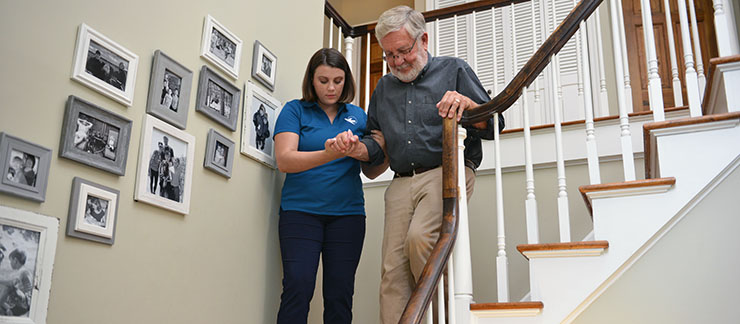
Help Seniors Avoid Accidents and Falls on Stairs
Did you know that falls are the number-one cause of injuries and trauma-related hospital admissions among seniors? Accidents while walking up or down the stairs are common places for seniors to suffer debilitating injuries in the home.
Unfortunately, as seniors advance in age, the risks increase as they begin losing their balance more frequently. They also lose strength and muscle mass, experience decreased vision and mobility, and become more disoriented or confused. And when they fall, conditions like osteoporosis can make an accident more harmful.
Stair Safety Tips to Prevent Falls
Most falls occur around the home, and the primary culprit – the stairway. Here are some tips and suggestions to help senior loved ones avoid fall hazards on the stairs:
- Stair maintenance
- Good lighting
- Proper footwear
- Stair coverings
- Handrails
- Hazard elimination
- Stair aids
Steps that are damaged, wobbly, or rotten can be a risk. Regularly inspect stairs closely for any signs of disrepair. Prompt maintenance can go a long way to reducing fall risks.
When the elderly cannot see the stairs properly due to poor lighting, they may slip or stumble. Make sure the entire length of the stairs is well lit, the light switch is in an easy-to-reach location, and lightbulbs are in working order.
Suitable shoes can help reduce trips and falls. Encourage your loved one to wear shoes or slippers that have a strong grip and avoid using socks or older and worn-out footwear.
Avoid bare wooden stairs that can be very slippery. Remove old, worn-out carpeting and replace it with a new, non-slip tread. Install rubber or vinyl matting for older adults who dislike carpeted stairs. Consider highlighting the edge of the stairs with bright paint or tape for your loved one to know where to step.
Install handrails on stairs if your loved one doesn’t have them. Handrails should be easy to grip and support your loved one’s weight.
Remove any tripping hazards, including rugs at the top or bottom of the staircase and other clutter.
Numerous aids are available that can help seniors safely navigate at home. Some stair aids include stairlifts, wheelchair lifts, stair-climbing canes, and moving handlebars to assist older adults while going up or down the stairs.
No matter how safe you make your loved one’s stairs, these tips won’t help if they don’t follow them. Make sure to check up on them regularly and remind them to keep practicing stair safety.
How Visiting Angels Assist with Fall Prevention
Our caregivers tend to the cognitive, emotional, and physical needs of our clients to help them live as independently as possible in the homes they love. Our dedicated home care professionals can support your loved one each day and ensure they practice safe habits on the stairs and around the house. Through our Fall Prevention Program, we can conduct a comprehensive assessment and provide personalized guidance to help prevent falls and other accidents to keep your senior safe.
Contact us today! Our home care coordinators are available to discuss your senior’s needs via a free home care consultation.


